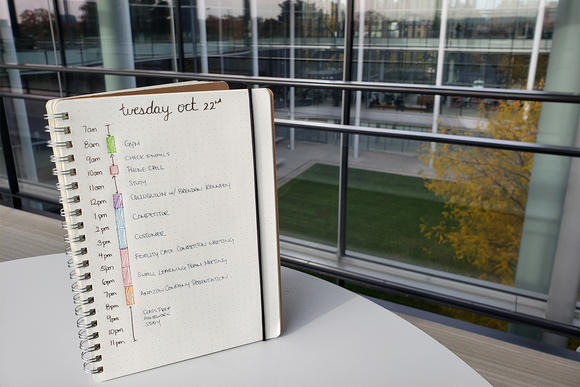
A Day in the Life at Yale SOM: Finding Balance
Carrie Law ’21 shares the challenges, choices, and joys that punctuate a day in the life of a first-year Yale SOM student.

“The first three months will be your hardest.” It’s a saying I’ve heard multiple times from second-year students here at SOM during my initial few weeks here. Two months in, and I can safely conclude that the statement is quite accurate.
It’s only day two of Fall-2, and the second half of the fall semester is already steam-rolling ahead. My alarm rings at 7:25 a.m. I don’t have class until 1 p.m. My body asks why I’m awake; my brain responds that I should be productive.
My brain wins, and I roll out of bed, make it to the gym (quite the accomplishment, I might add), workout, shower, and have breakfast. The rest of my morning is spent prepping for the lectures of the day, analyzing a 10k as part of a raw case that was assigned. It was a lot to sort through, but very typical of what I’ve had to do before coming to class each day.
Around 11:30 a.m., I head to campus and meet up with a couple of friends for lunch at Charley’s Place, the cafeteria in Evans Hall. Desperate for caffeine afterwards, I make a quick stop to grab coffee before heading to class.
From 1 to 4 p.m. I have my two classes of the day, Competitor and Customer. Each is focused on a different perspective, thanks to SOM’s integrated curriculum approach. In one, we discuss the raw case that I prepped in the morning, incorporating aspects from both accounting and economics to answer the key questions. The second class is a great and engaging introduction into the marketing aspect of the course.
The number one skill I’ve learned so far here at SOM is prioritization, and this day is an example of that. Post-class, I’m double-booked with two meetings: one with my small learning team to work over a problem set due two days from then, and one with my friend and teammate to work on our solution to an external case competition. After weighing my choices, I choose to meet with my teammate to discuss our case competition deliverable.
I inform my small learning team of the conflict, which they were all very understanding of, and after my other meeting, I end up rejoining my small learning team to make my contributions. Here I make my second decision of the night: I have a club meeting I had wanted to attend, but this time my academics are my priority, so I decide to skip the club meeting to finish the solution to our problem.
At 7 p.m. my day is still not yet done. I head over to Zhang Auditorium to attend a corporate presentation, then head up to the Beinecke Terrace for a networking session afterwards.
It’s around 9 p.m. when I make it home for dinner. I’m multitasking at this time, eating while doing homework while catching the last quarter of the Raptors’ home opener. It’s around midnight when I finally call it a night.
Ultimately, there are a million things to do and only 24 hours in a day. I’ve made sacrifices and missed opportunities, but at the end of the day, it does all balance itself out. The key is identifying what is truly important and prioritizing around that.
